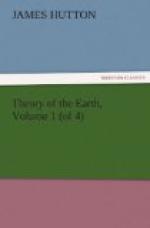Our author begins by examining a geological operation, the very opposite to that of mineral consolidation, and which would seem to have little connection with the subject of this dissertation. In my theory, I advanced two propositions with regard to the economy of this world: First, That the solid masses of this earth, when exposed to the atmosphere, decay, and are resolved into loose materials, of which the vegetable soil upon the surface is in part composed; and, secondly, That these loose materials are washed away by the currents of water, and thus carried at last into the sea. Our author says “Here are two suppositions, neither of which is grounded on facts;” and yet he has but the moment before made the following confession: “That the soil, however, receives an increase from some species of stones that moulder by exposition to the air cannot be denied, but there is no proof that all soil has arisen from decomposition.”—Surely all soil, that is made from the hard and compact body of the land, which is my proposition, must have arisen from decomposition; and I have no where said, that all the soil of this earth is made from the decomposition or detritus of those stony substances; for, masses of looser sand and softer substances contribute still more to the formation of vegetable soils.
With regard to the other proposition, our author says, “Soil is not constantly carried away by the water, even from mountains.”—I have not said that it is constantly washed away; for, while it is soil in which plants grow, it is not travelling to the sea, although it be on the road, and must there arrive in time. I have said, that it is necessarily washed away, that is, occasionally. M. de Luc’s authority is then referred to, as refuting this operation of water and time upon the soil. Now, I cannot help here observing, that our author seems to have as much misapprehended M. de Luc’s argument as he has done mine. That philosopher, in his letters to the Queen, has described most accurately the decay of the rocks and solid mountains of the Alps and Jura, and the travelling of their materials by water, although he does not carry them to the sea. It is true, indeed, that this author, who supposes the present earth on which we dwell very young, is anxious to make an earth, in time, that shall not decay nor be washed away at all; but that time is not come yet; therefore the authority, here given against my theory, is the speculative supposition, or mere opinion, of a natural philosopher, with regard to an event which may never come to pass, and which I shall have occasion to consider fully in another place.




